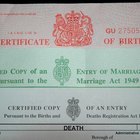
You may want to contact a long lost relative for a number of reasons, from sharing health information to getting closure about the past to simple curiosity. By being clear about why you’re writing, telling her how you found her and outlining necessary information, you can write an effective letter.
Step 1
Tell the person how you found her. If you located your relative through a genealogical website, let her know where in case she wants to delve more deeply into her past. If you found her name going through your mother’s belongings, it will be nice for her to know that she was still a part of your mom's thoughts.
Step 2
Identify your intentions, letting your relative know why you want to reconnect and what you would like to see happen next. If you are writing to share the death of a loved one, for example, but have no interest in ongoing communication, the vital information may be enough. But if you wish to have ongoing contact, include pieces of your life in the letter. Tell her about your family and your job. Let her know how you feel about finding her and why it mattered to you. If you’re comfortable with it, give her your email address or phone number so she can contact you in return more easily.
Step 3
Use the letter to work through the past, as necessary. Letter writing is effective creative therapy, even if you never send it. If you are writing a letter to a long lost relative as a way to resolve some past hurt, identify why her actions hurt you and what bothers you about it. For example, if you are upset that a long lost relative cut your father out of her life because he married your mother, be clear about how this affected you and your family. Avoid blaming or name calling. As in person, words are powerful, and “I am hurt” is more effective than “You’re a big jerk.” You can also write a first draft that includes the name-calling to get it all out, and rewrite an amended version without the name-calling that you can actually send.
Step 4
Outline vital information as clearly as you can. For instance, letter writing can inform family members about health issues that might affect them. Tell your relative the exact nature of the problem and why it might affect her. Include any steps she might need to take such as seeing a primary care doctor, or a geneticist if the issue is gene-related. On the other hand, if the information is more about an estate after the death of a loved one, let her know what she has to do to settle the estate and include the name and number of the lawyer handling it.
Related Articles

How to Find Mothers Maiden Name

How to Report Verbal Abuse Against a ...

How to Find Ancestry in Singapore

How to Find Out Who You're Related to ...

How to Sign a Marriage Certificate ...

How to Find Siblings Using the Birth ...

How to Write Letters to U.S. Soldiers ...

How to Find Birth Parents for Free

How to Write a Letter to Reconnect With ...

How to Find Someone's Date of Death for ...

How to Find Someone's Relatives

How to Obtain a Death Certificate in ...

How to Apologize for Telling a Secret

How to Deal With Backstabbing Relatives

Family Tree Book Cover Ideas

How to Trace the History of a Name

How to Find Relatives Alive & Dead

Nice Things to Write to Someone Who Has ...

How to Make a Genogram Chart

How to Write a Letter to an Ex-Spouse
References
Tips
- Find a quiet space to compose your letter so you can concentrate.
Writer Bio
Melody Causewell has been a writer in the mental health field since 2001. She written training manuals and clinical programs for mental health organizations. She has published feature articles "Leaven" magazine and has been published in "Natural Awakenings." She has a degree in psychology, a Masters degree in social work and is a La Leche League leader.
Photo Credits
STEFANOLUNARDI/iStock/Getty Images